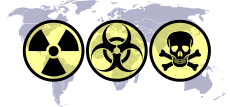Poland and weapons of mass destruction
| Weapons of mass destruction |
|---|
 |
| By type |
| By country |
|
| Proliferation |
| Treaties |
|
Poland is not known or believed to possess weapons of mass destruction. During the Cold War, Soviet nuclear warheads were stockpiled in Poland and designated to deploy within the People's Army of Poland. Poland was also working with Russia to help eliminate the large stockpiles of chemical and biological weapons developed by the Warsaw Pact countries. Poland ratified the Geneva Protocol on 4 February 1929.
Chemical weapons
Poland ratified the Chemical Weapons Convention in August 1995 and did not declare any offensive program or chemical weapons stockpiles. In 2004 during the G8 Summit, the Polish-Russian agreement in the sphere of chemical weapons destruction was reached. The chemical weapons agreement will assist Russia in disposing of its lewisite stockpiles.
Biological weapons
Poland ratified the Biological Weapons Convention on 25 January 1973 and is not known to have conducted any activity prohibited by the BWC.
Nuclear
Poland has never possessed nuclear weapons. Formerly, Poland was part of the Warsaw Pact. This meant that it was equipped with aircraft (such as MiG-21, Su-7 and Su-22), as well as short range ballistic missiles (such as R-300 Elbrus, 9K52 Luna-M and OTR-21 Tochka) that could be used to deliver Soviet nuclear weapons. These could and probably would be provided in time of war.[1] Prior to the end of the Cold War, the Soviet Union maintained large amounts of troops on Polish territory. These troops were equipped with nuclear weapons. In 1991, Poland announced that they would remove the nuclear capable delivery systems from their weapons inventory. They decided to keep about 40 of the OTR-21 Tochka systems armed with conventional warheads for self-defense.[2] These launchers have now been completely retired. In the 1970s there was an idea to develop a hydrogen bomb which was kept secret from the Soviet Union, however it was scrapped very quickly.
References
- ↑ Luczak 1996, pp. 19–21.
- ↑ Kapstein; Ethan B. Kapstein; Michael Mastanduno (1999). Unipolar Politics: Realism and State Strategies After the Cold War. Columbia University Press. p. 403. ISBN 0-231-11308-0.
Bibliography
- Luczak, Wojciech (July 1996). "Poland's Atomic Adventure". Air International. Vol. 51 no. 1. pp. 18–21. ISSN 0306-5634.